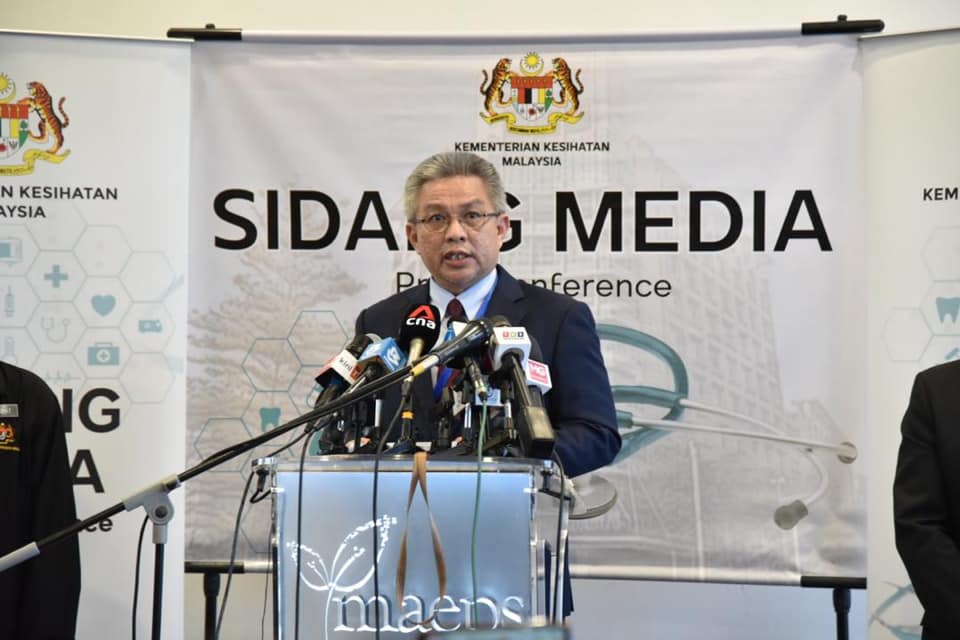KUALA LUMPUR, August 6 — The Ministry of Health (MOH) asserted that Malaysia did not record an increase in deaths among hospitalised people with conditions other than Covid-19 during the outbreak.
After one month of the Movement Control Order (MCO) that began last March 18, Senior Defence Minister Ismail Sabri Yaakob, in an announcement last April 19, permitted the delayed registration of new births and deaths up to 90 days from the end date of the MCO.
It is unknown if the government was referring to the strict MCO from March 18 to May 3, or subsequent phases of movement restrictions. The Recovery MCO (RMCO) is scheduled to last until August 31 since coming into effect on June 10.
“Although the country was hit by the Covid-19 pandemic, MOH still provided non-Covid-19 patient services at 139 hospitals nationwide.
“Our monitoring reveals that there was no increase in non-Covid-19 patient deaths during this period,” Health Minister Dr Adham Baba said in a written Parliament answer on July 28 to Bandar Kuching MP Dr Kelvin Yii, without specifying the time period of fatalities recorded.
The DAP lawmaker had questioned the ministry’s readiness and plans to handle the increase in cases as well as mortality among non-Covid-19 patients, especially those who missed treatments or medical appointments due to the pandemic.
He also urged MOH to spell out its forecast for an increase in mortality due to non-Covid-19 cases and its plans for action.
Dr Adham listed the measures taken by MOH to treat non-Covid-19 patients in the country from the Conditional MCO onwards since May 4 and subsequent RMCO, as below:
- Turning Covid-19 beds to non-coronavirus beds in stages at designated Covid-19 hospitals to treat non-coronavirus cases, in line with the drop of Covid-19 cases.
- Extending operating hours of specialist clinics as well as operating theatres after office hours, including on Saturdays for certain hospitals.
- Optimising the use of non-specialist hospitals to perform procedures or certain surgeries at cluster hospitals.
- Outsourcing certain services to private hospitals to reduce the waiting time for procedures or surgery.
- Virtual services, including virtual clinics, have commenced and will be expanded to several hospitals as well public health clinics (Klinik Kesihatan).
During the implementation of the seven-week MCO from March 18 to May 3, medical experts in the country warned the government that a prolonged lockdown or partial movement restrictions may increase fatalities among cancer and diabetic patients during the Covid-19 pandemic. A cancer group said last month that cancer treatment has been delayed from three to six months amid a backlog, as most cancer treatments are provided by major Covid-19 hospitals.
It is to be noted that a preliminary research revealed that Malaysia saw 1,015 more deaths from all causes (all-cause mortality) in the last quarter of 2019, compared to the same period in the three-year average from 2016 to 2018. An expert said this raised the possibility of late detection of Covid-19 in the country that only officially registered the first case on January 24.
Dr Ng Chiu Wan — a public health medicine specialist from the Department of Social and Preventive Medicine, University Malaya — also told a webinar last May that 461 more deaths occurred among those aged 60 and older from January till March 10 this year, compared to the average mortality in this age group in the same period in the years 2017 to 2019. The elderly are more vulnerable to developing severe disease from Covid-19.
Dr Ng’s early findings raised questions on whether Malaysia may have been unintentionally under-reporting deaths from Covid-19, like what was found in several countries that reported “excess deaths” during the pandemic, or a higher number of people who died than expected based on historical trends.
An international study published last May projected a backlog of 151,717 surgeries in Malaysian hospitals during a 12-week period of hospital services’ disruption due to the Covid-19 pandemic, requiring an 11-month backlog clearance time.
Among participating Malaysian hospitals in the study, the overall surgery cancellation rate was 70.9 per cent. The surgeries most subject to cancellation were those for benign diseases (81.5 per cent), followed by cancer surgery (41 per cent) and obstetrics (26.1 per cent).








